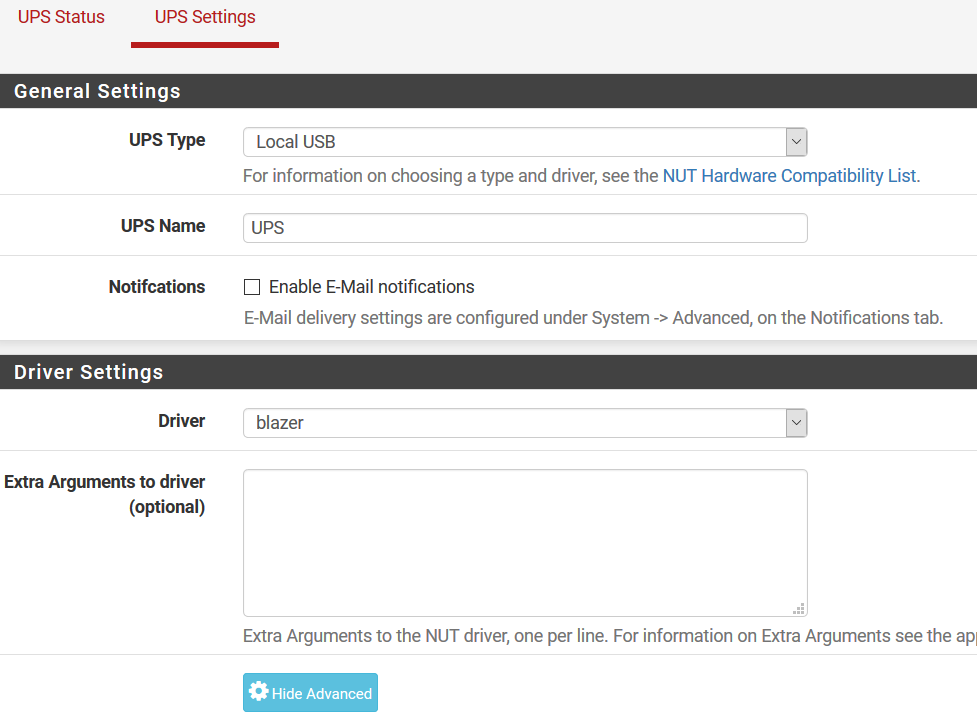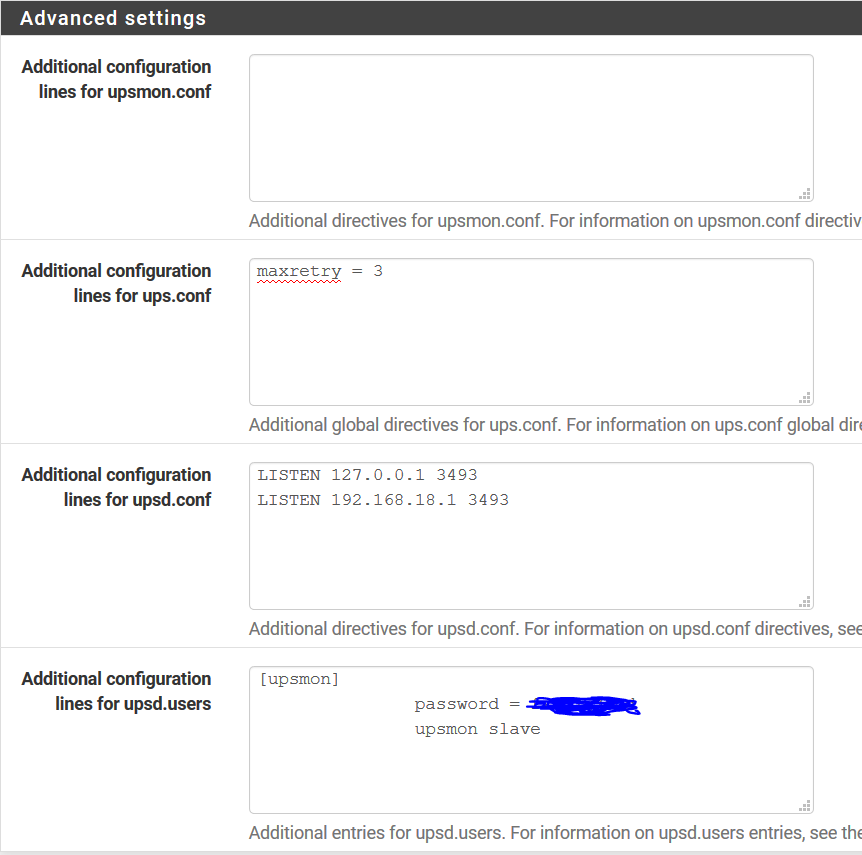-
@dennypage it's a USB A to B printer cable.
I might have resolved the issue by adding maxretry = 3 to ups.conf. After last nights power outage the UPS reconnected itself. However I see in syslog it reconnects every now and then, something still not 100% then maybe?
"usbconfig dump_device_desc": usbconfig dump.txt
Status/SystemLogs/System/General messages that match any of these strings, "usb", "ups", or "nut" following reboot: Syslog-USB.txt Syslog-UPS.txt Syslog-nut.txt
Actual settings:

-
@dennypage said in NUT package:
@doxymoron You may also wish to look at the HOSTSYNC variable, which would be set in the upsmon.conf section of the advanced settings.
Thanks for your help. I was able to get this working by just giving my 2 ESXi servers 2 minutes to shutdown before powering off the UPS using the override.ups.delay.shutdown option. I do have another question. If I were to get another UPS, am I able to also connect it via USB to my pfsense box and also monitor it? Thanks.
-
@lesodm [Sorry for the delay, I'm traveling]
Okay, several things now come to mind. Firstly, I'm going to assume that the usb to serial converter is imbedded in the ups itself and not something that you have separately installed. Btw, you didn't say what the manufacturer/model of the ups was.
First, please ensure you can get into the box via ssh because I want you to run the following tests without anything but the ups connected via usb. In other words, no usb keyboard, no usb mouse. I'm also assuming that at this point you are not using an external usb hub. Please confirm.
- Disable nut. Go into Services / UPS, select Disabled from the UPS Type drop down list, and press save.
- Reboot pfSense.
- Log in via ssh.
- Run "usbconfig dump_device_desc" and save the output.
- Run "ls -l /dev/cua*"
- Move the usb connection to a different port on the motherboard.
- Repeat steps 4-6 until you have tested all of the usb ports. Keep track of which port goes with which output.
Please post the results.
-
@doxymoron said in NUT package:
Thanks for your help.
You're quite welcome.
I do have another question. If I were to get another UPS, am I able to also connect it via USB to my pfsense box and also monitor it?
While nut itself has that capability, the pfSense gui does not. Were you thinking of a second ups that would provide power to the pfSense box via a redundant power supply? Or were you thinking of a second ups that provides power to another system (and are just looking for a way to monitor it)? If the latter, it's better to monitor it using the system whose power the ups controls. If that isn't available, you could also monitor it using nut in a lightweight guest running under the ESXi server.
-
@dennypage I was looking to separate the load and add a second UPS for my second ESXi server and network equipment. I will look into running another nut server inside a VM on that ESXi server, that seems like the best way. Thanks.
-
@dennypage
Hi, thanks for getting back to me. Only now been able to reboot.
Its a Tescom Otima Plus 3000 NM UPS.
No USB hub, though keyboard and mouse is connected via a KVM switch but I unplugged this before rebooting and testing.
Results for the 6 ports running "usbconfig dump_device_desc": port6.txt port5.txt port4.txt port3.txt port2.txt port1.txt
Ports 5 and 6 where through a PCI USB card
Running "ls -l /dev/cua*" has no results. -
@lesodm Based upon earlier logs, it looks like the USB serial adapter is taking a bit of time to initially appear on the bus, and subsequently disappearing and reappearing.
Most often I've seen this with older devices combined with usb 3 ports. Sometimes you even have to use an external hub to address the problem. My main server is unfortunately in this camp.
Things that I would recomend:
-
Focus on the disappearing problem first. The initial boot problem can be revisited (if it still exists) once the stability problem is determined.
-
Do not use the built-in usb 3 controller (port 1/2). This is the controller most likely to have issues with older devices.
-
Try the built-in usb 2 controller (port 3/4) first.
-
Try the add-on usb 2 controller (port 5/6).
-
Try using an external hub on any of the ports. I'm using an inexpensive Amazon hub on mine.
[Btw, I do not see the UPS connected when you did the scan of port 4...]
-
-
@dennypage, the disappearing issue is resolved in any of the USB 2 ports but only once the UPS driver has been loaded, the below error continues until I load the driver:
ugen0.3: <INNO TECH USB to Serial> at usbus0
ugen0.3: <INNO TECH USB to Serial> at usbus0 (disconnected)
And the driver now loads on boot as well. So looks like all sorted thanks!! -
@lesodm Glad to know it's working. Strange to see the disconnects on boot, but I Google'd a bit and saw others commenting about seeing continual disconnects with the Inno Tech until something opens the usb port. Perhaps something to do with how the Inno Tech usb to serial adapter is designed.
-
@dennypage, thanks again for all the previous help.
I am having issues at one of my other branches with a new UPS but can't pickup the UPS at all.
UPS Model: UDC9102S-RT SATURN : RM 2K ON-LINE UPS SR IB
Same settings in pfsense as the previous server.
Trying to start the driver but get below output:
/usr/local/sbin/upsdrvctl -u root start
Network UPS Tools - UPS driver controller 2.7.4
Network UPS Tools - Megatec/Q1 protocol USB driver 0.12 (2.7.4)
No supported devices found. Please check your device availability with 'lsusb'
and make sure you have an up-to-date version of NUT. If this does not help,
try running the driver with at least 'subdriver', 'vendorid' and 'productid'
options specified. Please refer to the man page for details about these options
(man 8 blazer_usb). -
@lesodm said in NUT package:
No supported devices found. Please check your device availability with 'lsusb' and make sure you have an up-to-date version of NUT. If this does not help, try running the driver with at least 'subdriver', 'vendorid' and 'productid' options specified. Please refer to the man page for details about these options (man 8 blazer_usb).
'lsusb' is a command on Linux. For FreeBSD, which pfSense is based upon, the equivalent is usbconfig. Use "usbconfig dump_device_desc" to see the list of devices just like you did on the other host.
-
@dennypage, thanks, sorry I should have given you more info on my troubleshooting before hand. I haven't used usbconfig before and couldn't see in the man page or comparing to the previous results what identifies the USB device to which port.
This sites firewall has 6 usb ports but only shows 2 in Usbconfig: usbconfig.txt
Tried switching to a few ports but I couldn't see anything changing to the output of usbconfig, what would I be looking for?
Dmesg output when I change between USB ports: dmesg.txt -
@lesodm said in NUT package:
This sites firewall has 6 usb ports but only shows 2 in Usbconfig: usbconfig.txt
Most common : USB ports are selectively deactivated in the BIOS. Quiet normal for devices that should be 'secured'.
Also possible : USB Root hub burned out, so several ports are simply 'broken'.
Next possibility : The FreeBSD kernel only recognizes some ports, but not others. Check with another OS.
If the boot process doesn't recognize the ports, you can't do much. -
I might have been reading usbconfig dump incorrectly.. The UPS is showing connected on ugen0.2 as <Prolific Technology Inc. USB-Serial Controller> usbconfig.txt
Maybe Blazer isn't the rite driver? I have tried all the other driver options under pfsense UPS settings. -
@lesodm said in NUT package:
The UPS is showing connected on ugen0.2 as <Prolific Technology Inc. USB-Serial Controller
This is a generic serial controller and will likely present as a serial port rather than that a usb port. With the ups connected and showing up in usbconfig, look for serial devices with "ls -l /dev/cua*". One of these devices should disappear and reappear when you unplug and replug the cable.
-
Hello im detecting high CPU usage on this last release:
PFSENSE: 2.4.4-RELEASE-p2
PACKAGE: nut sysutils 2.7.4_7
Diagnostics / System Activity:
PID USERNAME PRI NICE SIZE RES STATE C TIME WCPU COMMAND
99636 uucp 4 0 6452K 2504K RUN 0 3:19 58.89% /usr/local/sbin/upsmonups.conf:
[UPSXXXXX]
driver=snmp-ups
port=10.10.10.10
mibs=ietf
snmp_version=v1
community=public
pollfreq=60
snmp_timeout=10
snmp_retries=10 -
NUT was working fine but I had to restore some configuration in pfsense 2.4.4-RELEASE-p2. After that I loaded the NUT package but it fails to start. I've tried rebooting, reloading package, etc.
I removed nut and tried apcupsd and it works so I removed that and loaded nut again but it fails to load.
I can't find logs or any idea why it would fail when it worked before. Is it odd that the package is 2.7.4_7 but has a dependency of nut_2.7.4_8? (I was told on /r/pfsense that was unrelated.)
-
@stevemac00 Look for entries in the system log (Status / System Logs / System / General) matching either "nut" or "ups". Use the funnel icon to scan.
-
When I restored configuration for some reason it didn't reconfigure. I did manually and it works again. Probably operator error. Thank you for replying.
-
I'm using NUT 2.7.4_7 with a APC Back UPS Pro 550 USB but I don't get it to work. I selected the usbhid driver, but I always see in logs:
Apr 16 22:52:07 upsmon 69828 Poll UPS [APC_BackUPS_Pro_550] failed - Driver not connected Apr 16 22:52:02 upsmon 69828 Poll UPS [APC_BackUPS_Pro_550] failed - Driver not connected Apr 16 22:50:52 upsmon 69828 Poll UPS [APC_BackUPS_Pro_550] failed - Driver not connected Apr 16 22:50:47 upsmon 69828 UPS APC_BackUPS_Pro_550 is unavailable Apr 16 22:50:47 upsmon 69828 Poll UPS [APC_BackUPS_Pro_550] failed - Driver not connectedAny idea?
Copyright 2025 Rubicon Communications LLC (Netgate). All rights reserved.